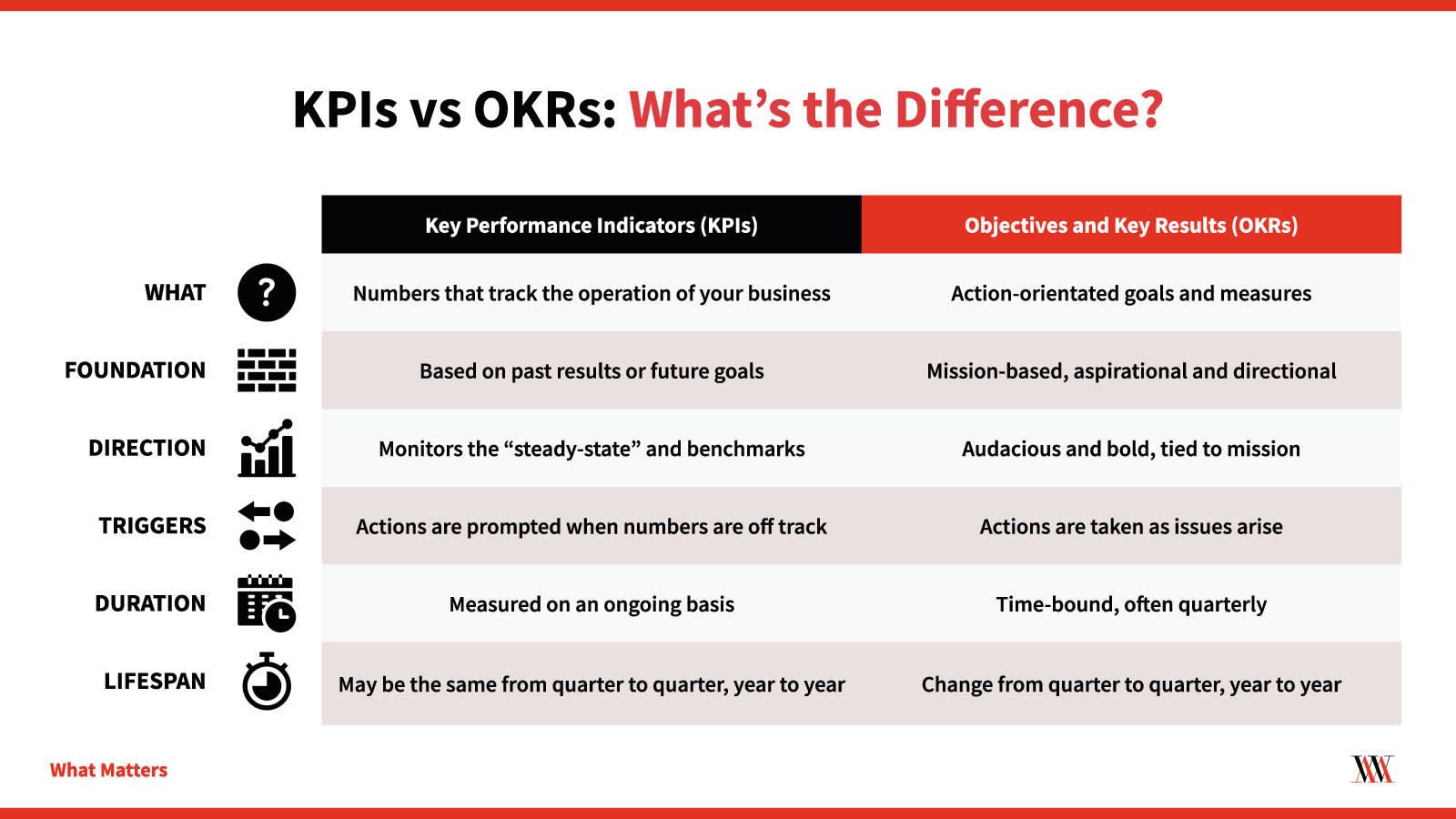
How is OKR better than KPI
OKRs are used to set and track progress toward strategic objectives, while KPIs measure performance against specific targets and benchmarks. OKRs provide a directional framework for the organization, while KPIs provide a quantitative measurement of progress toward the organization's goals.
What is OKR instead of KPI
Objectives and key results (OKRs) require you to identify both your target and the metrics that will help you stay on track. Key performance indicators (KPIs) are focused only on tracking your progress — think of them like the signals that you're heading the right way.
Can a KPI become an OKR
It's important to maintain KPIs to track vital elements of your organization. And while KPIs are often considered BAU, there are times when KPIs can inform — and even become — your OKRs if it's a measurement that you want to significantly change.
What is the difference between OKR key results and KPI
What is an OKR OKR is the acronym for objective and key results—more specifically, an objective is tied to key results. OKR is a strategic framework, whereas KPIs are measurements that exist within a framework. OKR is a simplistic, black-and-white approach that uses specific metrics to track the achievement of a goal.
What are the advantages of using OKR
Top 15 benefits of using OKRs:Align and connect your employees to your corporate goals.Give clear direction to every team and individual.Increase productivity through focus on goals.Track regular progress towards goals.Make more effective and informed decisions.Achieve measurement, accountability, and transparency.
Why OKRs are better than SMART goals
In summary, OKRs are useful for setting ambitious, long-term goals, while SMART goals are guidelines useful for setting specific, short-term goals that are achievable within a specific timeframe.
What is the difference between OKR and KPI vs metric
Differences between OKRs and KPIs
OKR is a goal-setting framework. For each OKR, there is an objective to be achieved, along with a set of metrics that will measure the achievement of that objective, called key results. KPIs determine factors needed to achieve success in an organization.
What is the difference between OKR and KPI vs smart
' People need to own an objective and be inspired. KPIs are just all numbers. SMART goals may be inspiring, and they have numbers. OKRs offer something for people who aren't numbers-driven."
What is the difference between OKR and KPI and SMART goals
KPIs are just all numbers. SMART goals may be inspiring, and they have numbers. OKRs offer something for people who aren't numbers-driven." Read our article to learn more about OKRs and KPIs.
What are the 5 benefits of OKRs
It can help achieve mission and vision, aid in employee engagement, and bring to the surface the top priorities of a company. OKR's five key benefits include focus, alignment, commitment, tracking, and stretching — or as John Doerr likes to call them, “the five superpowers” of OKRs.
How do you use OKRs effectively
7 OKR Best PracticesKeep it Simple. Focus on objectives you know you can achieve in the given timeframe.Be Specific.Cascade Your Objectives.Make it Measurable.Don't Worry About Stretch Goals.Break Key Results into Smaller Goals.Celebrate and Recognize.
What is the difference between KPI and OKR in agile
OKRs vs. KPIs: OKRs can help you solve big problems, reach for the stars, and innovate boldly, while KPIs can help you monitor performance and identify opportunities for improvement. OKRs are best for those big-picture, growth-oriented goals.
What is the difference between OKR and KPI medium
KPIs focus mostly on the outcome, whereas OKRs are also concerned with the process. OKRs speak to the larger vision, the big picture of what the company is trying to achieve, whereas KPIs aim to scale or improve a certain project.
What is the main purpose of OKR
“OKR” stands for Objectives and Key Results. OKRs are an effective goal-setting and leadership tool for communicating what you want to accomplish and what milestones you'll need to meet in order to accomplish it. OKRs are used by some of the world's leading organizations to set and enact their strategies.
When should you use OKRs
They're typically used to set quarterly goals, but can also be used for annual planning. As you can see in these marketing OKR examples, company OKRs focus on big-picture goals, team OKRs define priorities for each department, and personal OKRs pinpoint what an individual will be working on.


